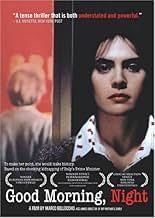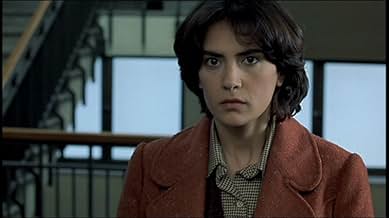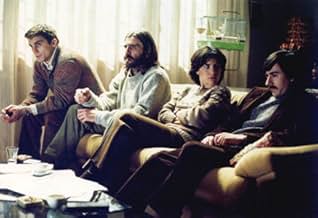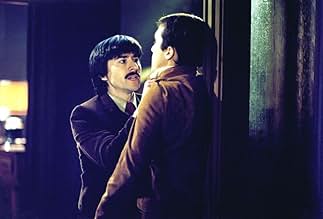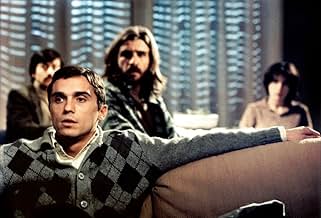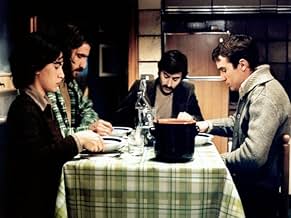AVALIAÇÃO DA IMDb
7,1/10
4,2 mil
SUA AVALIAÇÃO
Adicionar um enredo no seu idiomaThe 1978 kidnapping of politician Aldo Moro as seen from the perspective of one of his assailants: a conflicted young woman in the ranks of the Red Brigade.The 1978 kidnapping of politician Aldo Moro as seen from the perspective of one of his assailants: a conflicted young woman in the ranks of the Red Brigade.The 1978 kidnapping of politician Aldo Moro as seen from the perspective of one of his assailants: a conflicted young woman in the ranks of the Red Brigade.
- Direção
- Roteiristas
- Artistas
- Prêmios
- 13 vitórias e 21 indicações no total
Giulio Bosetti
- Paolo VI
- (as Giulio Stefano Bosetti)
Avaliações em destaque
This is a very good docu-drama about a kidnapping and assassination of a former Prime Minister Aldo Moro of Italy in 1978 by the Red Brigades. Pretty much the whole movie takes place in the hideout where they are keeping the politician, trying to negotiate a change in government and even getting the Pope involved. One of the most amazing things about the movie to me, outside of excellent story telling, is the use of Pink Floyd music. There's not too many movies that get the right to use PF music, but this movie does with "Shine on you crazy Diamond" and "The Great Gig in the Sky". Extremely powerful music to establish tone and mood in the movie, and very effective. I thoroughly enjoyed this movie, and the DVD documentary extra is very good too. It gives a great background to the true story, and a good profile of the filmmaker.
The true story of the kidnap of Italian political leader Aldo Moro by the Red Brigades in 1978 is turned into a haunting, disturbing tone poem of s film.
Eschewing realism, or the obvious tense, linear approach, this focuses on the experience through the eyes of one the young kidnappers, and her ever growing doubts about the righteousness of the mission. But rather than express this literally, we see it emerge in dream sequences, and behind her eyes.
Beautifully shot, with a terrific use of classical and modern music (Pink Floyd shows up more than once) this quiet nightmare of a film is far more effecting and thought provoking than most political dramas. It does not miss the irony that Aldo was a humanist who was actually inviting the communist party to be part of the government.
A great cautionary truth based fable about the danger of giving yourself completely and unquestioningly to any ideology, left or right, religious or secular.
Eschewing realism, or the obvious tense, linear approach, this focuses on the experience through the eyes of one the young kidnappers, and her ever growing doubts about the righteousness of the mission. But rather than express this literally, we see it emerge in dream sequences, and behind her eyes.
Beautifully shot, with a terrific use of classical and modern music (Pink Floyd shows up more than once) this quiet nightmare of a film is far more effecting and thought provoking than most political dramas. It does not miss the irony that Aldo was a humanist who was actually inviting the communist party to be part of the government.
A great cautionary truth based fable about the danger of giving yourself completely and unquestioningly to any ideology, left or right, religious or secular.
"Good Morning, Night (Buongiorno, notte)" is an intriguing effort to understand terrorists.
Loosely based on a novel, writer/director Marco Bellocchio specifically re-imagines the kidnapping of Italian party leader Aldo Moro in 1987, with heavy use of television clips. The quaintly naive Cold War rhetoric, emphasized with odd historic black and white newsreel interstices such as of Stalinist parades, may now be seen as an examination of a symbolic precursor for today's gruesome politics, though he was already working on the film at 9/11.
The young idealists we are first introduced to seem as harmless as the radical pranksters in the contemporary "The Edukators (Die Fetten Jahre sind vorbei)." While it's a jolt to gradually learn their connection to the violent attack, first revealed as they cheer at the initial TV coverage, they seem so bumbling and nervous (one takes leave abruptly for, as it were, a conjugal visit as he feels he's the one being imprisoned; another gets fixated on an overly symbolic pet caged bird), it's never clear if they personally committed murder or if they're just the guardian cell taking orders from those who stage the mock trial and pull the triggers or if that is a moral difference that is intentionally considered irrelevant.
Real world politics do occasionally seep through in silent background commentary, through factory strikes and sarcastic graffiti, but the determined ideologues reject these actions as they see themselves as the true believers. Ironically, the drone of the TV coverage, with reports of related and unrelated violent acts around the country, they anxiously watch becomes as much a recitation as the opening pitch from the bored apartment rental agent.
Their Red Brigade aims seem so diffuse about intending to set off revolutions and counter-revolutions, compared to the more direct motives of the terrorists in "Paradise Now" (let alone how kidnapping has devolved into a business, as in "Secuestro Express"), at least to those not intimately familiar with Italian political dialectics, that it seems more understandable than ludicrous that the negotiations draw on. A long side bar scene where one of the kidnappers joins her family in a memorial service for World War II partisans nostalgically singing an anti-Fascist anthem, inspiring her to read a collection of letters resistance fighters wrote before their executions instead of her usual Lenin or Engels reading, makes the dialectics even more ironic as to what fascist behavior is. Her internal struggle to resolve these pressures, including several confusing dream sequences, is the core of the film and Maya Sansa, with very expressive eyes, is captivating as "Chiara."
The kidnapping itself takes on a "Ransom of Red Chief" feel as the Aldo Moro character, well-played by Roberto Herlitzka and the point of the film's dedication to the auteur's father, is much more of an eloquent, dignified, paternal humanist statesman than a typical politician. The kidnappers seem to be thwarted in provoking political crisis because he will only write personal, non-political notes to his family, particularly his grandson (even if does seem as if he's writing love notes to his mistress rather than to his wife). But his appeal to the pope and the pope's involvement in the negotiations and their aftermath seems as incongruous as an odd séance by political supporters or the kidnappers doing a blessing before eating. Compared to the director's earlier "My Mother's Smile (L'Ora di religione: Il sorriso di mia madre)," religion is only an ancillary issue.
The auteur's voice, as an artist, seems to speak through a somewhat naive and flirtatious friend of "Chiara"s who has written a screenplay about radicals and quotes the Emily Dickinson poem that inspired the title. He argues that the imagination can be a powerful force in influencing people, though of course the authorities misinterpret his involvement.
I saw it with a defective soundtrack, but other than odd musical commentary with bombastic selections from "Aida" and Pink Floyd, the film's strength is faces and looking into the eyes of deluded cogs in the wheel of historical forces, though the best sequence is given away in the trailer.
Loosely based on a novel, writer/director Marco Bellocchio specifically re-imagines the kidnapping of Italian party leader Aldo Moro in 1987, with heavy use of television clips. The quaintly naive Cold War rhetoric, emphasized with odd historic black and white newsreel interstices such as of Stalinist parades, may now be seen as an examination of a symbolic precursor for today's gruesome politics, though he was already working on the film at 9/11.
The young idealists we are first introduced to seem as harmless as the radical pranksters in the contemporary "The Edukators (Die Fetten Jahre sind vorbei)." While it's a jolt to gradually learn their connection to the violent attack, first revealed as they cheer at the initial TV coverage, they seem so bumbling and nervous (one takes leave abruptly for, as it were, a conjugal visit as he feels he's the one being imprisoned; another gets fixated on an overly symbolic pet caged bird), it's never clear if they personally committed murder or if they're just the guardian cell taking orders from those who stage the mock trial and pull the triggers or if that is a moral difference that is intentionally considered irrelevant.
Real world politics do occasionally seep through in silent background commentary, through factory strikes and sarcastic graffiti, but the determined ideologues reject these actions as they see themselves as the true believers. Ironically, the drone of the TV coverage, with reports of related and unrelated violent acts around the country, they anxiously watch becomes as much a recitation as the opening pitch from the bored apartment rental agent.
Their Red Brigade aims seem so diffuse about intending to set off revolutions and counter-revolutions, compared to the more direct motives of the terrorists in "Paradise Now" (let alone how kidnapping has devolved into a business, as in "Secuestro Express"), at least to those not intimately familiar with Italian political dialectics, that it seems more understandable than ludicrous that the negotiations draw on. A long side bar scene where one of the kidnappers joins her family in a memorial service for World War II partisans nostalgically singing an anti-Fascist anthem, inspiring her to read a collection of letters resistance fighters wrote before their executions instead of her usual Lenin or Engels reading, makes the dialectics even more ironic as to what fascist behavior is. Her internal struggle to resolve these pressures, including several confusing dream sequences, is the core of the film and Maya Sansa, with very expressive eyes, is captivating as "Chiara."
The kidnapping itself takes on a "Ransom of Red Chief" feel as the Aldo Moro character, well-played by Roberto Herlitzka and the point of the film's dedication to the auteur's father, is much more of an eloquent, dignified, paternal humanist statesman than a typical politician. The kidnappers seem to be thwarted in provoking political crisis because he will only write personal, non-political notes to his family, particularly his grandson (even if does seem as if he's writing love notes to his mistress rather than to his wife). But his appeal to the pope and the pope's involvement in the negotiations and their aftermath seems as incongruous as an odd séance by political supporters or the kidnappers doing a blessing before eating. Compared to the director's earlier "My Mother's Smile (L'Ora di religione: Il sorriso di mia madre)," religion is only an ancillary issue.
The auteur's voice, as an artist, seems to speak through a somewhat naive and flirtatious friend of "Chiara"s who has written a screenplay about radicals and quotes the Emily Dickinson poem that inspired the title. He argues that the imagination can be a powerful force in influencing people, though of course the authorities misinterpret his involvement.
I saw it with a defective soundtrack, but other than odd musical commentary with bombastic selections from "Aida" and Pink Floyd, the film's strength is faces and looking into the eyes of deluded cogs in the wheel of historical forces, though the best sequence is given away in the trailer.
I've read the other comments on this board and I would like to precise that Aldo Moro at the time was not the Italian President and that obviously the Red Brigades were out for his blood because he was working skilfully at a compromise between the Christian Democrats and the Communists and that meant for the extremists of the left to be cut out from any kind of power or hold they might have on the Government. The film itself does not seek to give political answers and is much more concerned with the human aspects of the drama. It's more lyrical than realistic... if you're looking for action or for a docudrama, you should probably go elsewhere.
Aldo Moro's kidnapping and murder was at its time a huge event for the Italian history and the world. With the recrudescence of terrorism at the beginning of the 70s, some of the extreme left movements in Europe - especially in Germany and Italy - embraced the path of the 'armed struggle', a deformation of the Marxist concept of class struggle in a try to stop the historical reconciliation between the traditional political parties and an Italian Comminist Party already feeling the winds of reform that will melt down the Iron Curtain 10-15 years later.
Marco Bellocchio's film tackles the story from the perspective of the day to day life of the kidnappers, and through the eyes and dreams of one of the kidnappers - the only female in the group. We do not see any of the bloody events of the kidnapping or the outcome, and most of the action happens in the rented flat where the captors kept Moro imprisoned. The director and the splendid main actress Maya Sansa succeed to re-create the political conditioning and the motivations that brought the young woman to join the terrorist fighting path, but also the human dimension that brings her back the feelings of compassion to the victim. It is Aldo Moro's portrait played by Roberto Herlitzka which seems surprinsigly more sketchy, and I had the feeling that a greater message about the relationship between kidnapper and victim was missed.
It is still an interesting movie to watch, minor in style but human, dealing from a different perspective with a theme that too often generated films that were spectacular, but deprived of any true emotion. 8 out of 10 on my personal scale.
Marco Bellocchio's film tackles the story from the perspective of the day to day life of the kidnappers, and through the eyes and dreams of one of the kidnappers - the only female in the group. We do not see any of the bloody events of the kidnapping or the outcome, and most of the action happens in the rented flat where the captors kept Moro imprisoned. The director and the splendid main actress Maya Sansa succeed to re-create the political conditioning and the motivations that brought the young woman to join the terrorist fighting path, but also the human dimension that brings her back the feelings of compassion to the victim. It is Aldo Moro's portrait played by Roberto Herlitzka which seems surprinsigly more sketchy, and I had the feeling that a greater message about the relationship between kidnapper and victim was missed.
It is still an interesting movie to watch, minor in style but human, dealing from a different perspective with a theme that too often generated films that were spectacular, but deprived of any true emotion. 8 out of 10 on my personal scale.
Você sabia?
- CuriosidadesWas appreciated by the relatives of Aldo Moro.
- Erros de gravaçãoNear the end, when Aldo Moro walks away in the deserted street, you can see a multicolored Peace flag in the background. Those flags would decorate Italian streets only in 2003, to oppose the invasion of Iraq.
- Trilhas sonorasMarcia trionfale
(from "Aida")
Composed by Giuseppe Verdi
Performed by Orchestra e Coro del Teatro dell'Opera di Roma
Conducted by Georg Solti
Decca Records, 1962
Principais escolhas
Faça login para avaliar e ver a lista de recomendações personalizadas
- How long is Good Morning, Night?Fornecido pela Alexa
Detalhes
Bilheteria
- Faturamento bruto nos EUA e Canadá
- US$ 10.093
- Fim de semana de estreia nos EUA e Canadá
- US$ 2.769
- 13 de nov. de 2005
- Faturamento bruto mundial
- US$ 4.240.918
- Tempo de duração
- 1 h 46 min(106 min)
- Cor
- Mixagem de som
- Proporção
- 1.66 : 1
Contribua para esta página
Sugerir uma alteração ou adicionar conteúdo ausente

